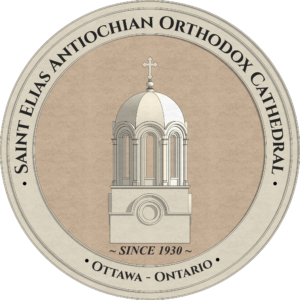The Sacramental Life
God has made it possible for us to come to know Him through His Revelation in the Bible, His Incarnation in Jesus Christ and through reception of the Holy Mysteries (Sacraments). Through the Sacraments, we commune with God in a mystical way. The Sacraments are our means of experiencing salvation in this life and a taste of eternal life to come. The following is an overview of the most common mysteries in the Life of the Orthodox Christian faithful.
Baptism
“Go therefore and make disciples of all nations, baptizing them in the name of the Father and the Son and the Holy Spirit, teaching them to observe all that I have commanded you” – (Matthew 28:18-20).
Baptism is the Sacrament by which those immersed into water in the name of the Holy Trinity are reborn. By this, we are buried in the water and then rise out to put on a new life in Christ Himself. In Baptism, we are washed in Christ, received into a divine relationship and we promise to devote our lives to the service of God.
Parents should discuss plans for the Baptism of their child with the priest prior to making any commitments concerning the Baptism, naming a sponsor, date and time.
For more details about Baptisms at St. Elias Cathedral visit the following page: https://steliascathedral.com/sacraments-forms.
Christmation and Reception of Converts
Adults who wish to be received into communion with the Orthodox Church are provided a period of introduction and instruction. Under the guidance of the priest and with the encouragement of the community, the candidate participates in the worship of the parish and learns the basic teaching of the Orthodox Faith. The candidate is formally received into the life of the Church through the Sacrament of Baptism or by Chrismation (if previously baptized as a Christian in the name of the Holy Trinity and immersion of water). Through Chrismation, the seal of the gift of the Holy Spirit is given to confirm us in the Orthodox Faith. An Orthodox sponsor is required for the reception of converts.
It is God who establishes us with you in Christ, and has commissioned us; He has put His seal upon us and given us His Spirit in our hearts as a guarantee. – (2 Corinthians 1:21-22).
Confession
If we confess our sins, He is faithful and just, and He will forgive our sins and cleanse us from all unrighteousness – (1 John 1:9).
This Sacrament of Penance allows us to be forgiven for those sins we commit after our Baptism. We cleanse our Baptismal garment through the tears of our repentance. It is necessary to be aware and reflective of our sinfulness so we can grow spiritually. Many describe sin as missing the mark; therefore we confess our sins so that our aim becomes more direct. Consistent participation in this Sacrament is essential for all Orthodox. Confession is offered Saturday from 4 to 5 pm or by appointment.
If we confess our sins, He is faithful and just, and He will forgive our sins and cleanse us from all unrighteousness – (1 John 1:9).
This Sacrament of Penance allows us to be forgiven for those sins we commit after our Baptism. We cleanse our Baptismal garment through the tears of our repentance. It is necessary to be aware and reflective of our sinfulness so we can grow spiritually. Many describe sin as missing the mark; therefore we confess our sins so that our aim becomes more direct. Consistent participation in this Sacrament is essential for all Orthodox. Confession is offered Saturday from 4 to 5 pm or by appointment.
Communion (Eucharist)
The one who eats my flesh and drinks my blood abides in me and I in him – (John 6:56).
This is our Holy Communion with God through Jesus Christ. We are spiritually fed by receiving the true body and blood of Christ. Christ instituted this Sacrament at His Last (Mystical) Supper to show the new relationship that exists between God and His Church. The Eucharist is the central mystery of the Church. When we receive the precious Body and Blood of Christ, we become filled with the saving presence of God the Son. The preparation and offering of Holy Communion in the Liturgy is the principle work of the parish. Only Orthodox Christians should approach the chalice for Holy Communion. All others are invited to pray with us and receive portion of the antidoron (blessed bread) after venerating the Cross after the dismissal.
Orthodox believers should prepare to receive the Eucharist: through prayer, fasting and regular Confession.
The Eucharistic Fast is observed as part of our preparation to receive Communion. Fasting among Christians is rooted in the example of Christ and His disciples. If Communion is to be received in the morning, then we fast from food and drink from the night before. If Communion is to be received in the evening, then we fast from our noon meal on. Fasting regulations are relaxed for children, the sick, the elderly, or those with medicinal needs.
Marriage
“Therefore shall a man leave his father and mother, and shall cleave unto his wife: and will be one flesh” – (Genesis 2:24).
